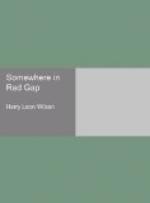Could his fallen idol be there, I wondered? Purposefully I also watched the door of the stable. Presently it opened slightly; then, with evident infinite caution, it was pushed outward until it hung half yawning. A palpitant moment we gazed, Boogles and I. Then shot from the stable gloom an astounding figure in headlong flight. Its goal appeared to be the bunk house fifty yards distant; but its course was devious, laid clearly with a view to securing such incidental brief shelter as would be afforded by the corral wall, by a meagre clump of buck-brush, by a wagon, by a stack of hay. Good time was made, however. The fugitive vanished into the bunk house and the door of that structure was slammed to. But now the small puzzle I had thought to solve had grown to be, in that brief space—easily under eight seconds—a mystery of enormous, of sheerly inhuman dimensions. For the swift and winged one had been all too plainly a correctly uniformed messenger boy of the Western Union Telegraph Company—that blue uniform with metal buttons, with the corded red at the trouser sides, the flat cap fronted by a badge of nickel—unthinkable, yet there. And the speedy bearer of this scenic investiture had been the desperate, blood-letting, two-gun bad man of the Arrowhead.
It was a complication not to be borne with any restraint. I hastened to stand before the shut door of the sanctuary. It slept in an unpromising stillness. Invincibly reticent it seemed, even when the anguished face of Jimmie Time, under that incredible cap with its nickeled badge, wavered an instant back of the grimy window—wavered and vanished with an effect of very stubborn finality. I would risk no defeat there. I passed resolutely on to Boogles, who now most diligently trained up tender young bean vines in the way they should go.
“Why does he hide in there?” I demanded in a loud, indignant voice. I was to have no nonsense about it.
Boogles turned on me the slow, lofty, considering regard of a United States senator submitting to photography for publication in a press that has no respect for private rights. He lacked but a few clothes and the portico of a capitol. Speech became immanent in him. One should not have been surprised to hear him utter decorative words meant for the rejoicing and incitement of voters. Yet he only said—or started to say:
“Little Sure Shot’ll get that Chink yet! I tell you, now, that old boy is sure the real Peruvian—”
This was absurdly too much. I then and there opened on Boogles, opened flooding gates of wrath and scorn on him—for him and for his idol of clay who, I flatly told him, could not be the real doughnuts of any sort. As for his being the real Peruvian—Faugh!
Often I had wished to test in speech the widely alleged merits of this vocable. I found it do all that has been claimed for it. Its effect on Boogles was so withering that I used it repeatedly in the next three minutes. I even faughed him twice in succession, which is very insulting and beneficial indeed, and has a pleasant feel on the lips.




